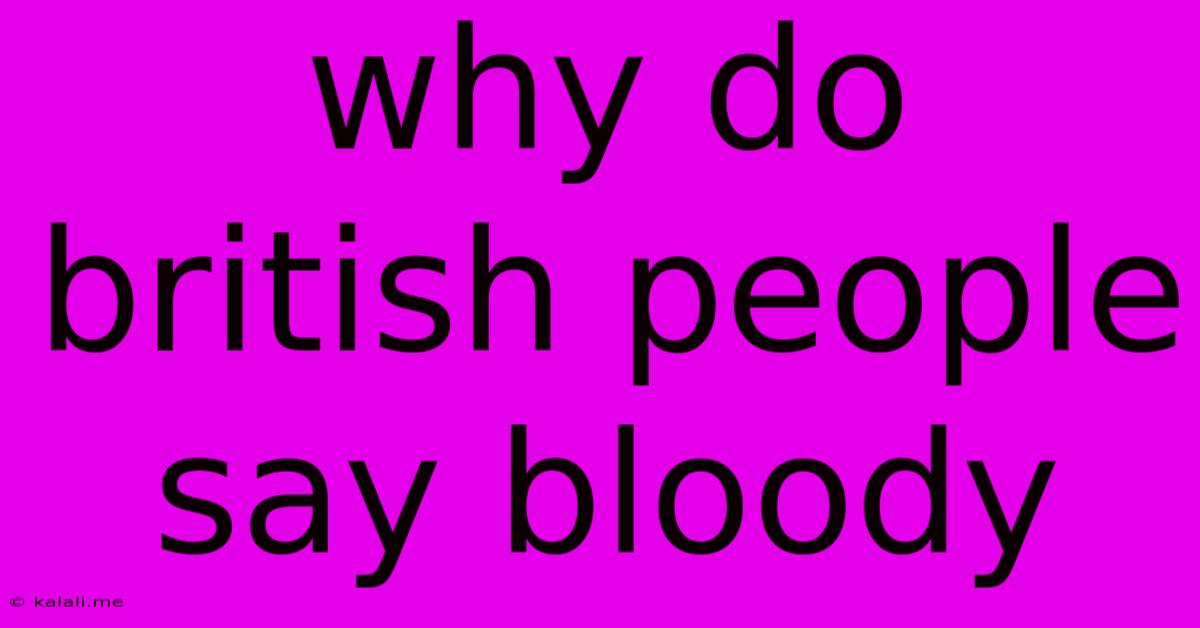Why Do British People Say Bloody
Kalali
Jun 11, 2025 · 3 min read

Table of Contents
Why Do British People Say "Bloody"? Unpacking the Ubiquitous British Expletive
The seemingly innocuous word "bloody" is far more prevalent in British English than its American counterpart. But why? Understanding its history and cultural context reveals a fascinating insight into British slang and its evolution. This article will delve into the origins, usage, and enduring appeal of this quintessential British term.
The Origins of "Bloody": A History Steeped in Religious Undertones
The word's origins lie in the adjective "blood," and its earliest recorded usage dates back to the 14th century. Initially, it held a more literal meaning, referring to something stained with blood or characterized by bloodshed. However, its evolution into a common intensifier is linked to its association with Christ's blood. Using "blood" or "bloody" as an exclamation became a way to invoke a religious oath, albeit a mildly profane one.
Over time, the religious connotations faded, and "bloody" transitioned into a more general intensifier, similar to "very" or "damn." This shift occurred gradually, with its profane usage increasing throughout the centuries. By the Victorian era, it had become a relatively common, albeit somewhat taboo, expletive.
The Modern Usage of "Bloody": More Than Just a Swear Word
Today, "bloody" holds a unique position in British English. It's far more versatile than its seemingly equivalent counterparts in American English. It’s used in a multitude of contexts, lending a different flavor depending on the intonation and the situation:
- As an intensifier: "That's a bloody good idea!" Here, it simply adds emphasis, similar to "very" or "really."
- As an expression of frustration or annoyance: "Bloody hell! I missed the train again!" This usage expresses a mild level of exasperation.
- As a general expletive: "Bloody idiot!" This is a stronger expression of displeasure, but still considerably milder than harsher swear words.
- As a way to express surprise or amazement: "Bloody amazing!" This usage shows strong positive emotion.
The versatility of "bloody" is a key reason for its widespread use. It can convey a range of emotions, from mild irritation to enthusiastic approval, making it a highly adaptable term.
Why is "Bloody" So Common in British English? A Cultural Perspective
Several factors contribute to the prevalence of "bloody" in British English:
- Cultural Acceptance: British society generally has a higher tolerance for mild expletives compared to some other cultures, leading to its widespread acceptance in everyday conversation.
- Euphemism Treadmill: As stronger swear words become taboo, milder ones like "bloody" take their place, constantly evolving in their intensity.
- Regional Variations: While common throughout the UK, the frequency and acceptance of "bloody" can vary regionally.
- Generation Differences: Younger generations might use "bloody" less frequently than older generations, yet it still remains a staple in British vernacular.
Bloody Brilliant! Concluding Thoughts
In conclusion, the word "bloody" is far more than just a simple expletive. Its history, its versatile usage, and its cultural acceptance make it a uniquely British linguistic phenomenon. Its continued prevalence reflects the ever-evolving nature of language and its adaptation to cultural norms. Understanding its background adds another layer of appreciation to the richness and complexity of the English language, particularly its British variant.
Latest Posts
Latest Posts
-
What Is The Unit Of Strain
Jun 12, 2025
-
Which Subatomic Particle Has The Least Mass
Jun 12, 2025
-
Which Of The Following Is Not A Component Of Health
Jun 12, 2025
-
Who Wrote National Song Of India
Jun 12, 2025
-
Kathak Dance Is From Which State
Jun 12, 2025
Related Post
Thank you for visiting our website which covers about Why Do British People Say Bloody . We hope the information provided has been useful to you. Feel free to contact us if you have any questions or need further assistance. See you next time and don't miss to bookmark.